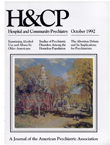Age-Related Psychiatric Comorbidities and Level of Functioning in Alcoholic Veterans Seeking Outpatient Treatment
Abstract
The relationship of age and of level of adaptive functioning to comorbidity of mental disorders among alcoholics was studied in a survey of all alcoholics seeking outpatient mental health treatment in the Veterans Affairs mental health care system during a one-month period in 1986 (N=22,463). More than half of the alcoholics outpatients had one or more comorbid psychiatric diagnoses. Rates for comorbid substance abuse disorders, posttraumatic stress disorder, schizophrenia, and personality disorders peaked in younger acoholics and then decreased with age. Agerelated increases were observed for major depression, anxiety disorders, and organic brain syndrome or dementia. DSM-III axis V ratings of poor to grossly impaired f unctioning were consistent across age groups. More than half of alcoholics with a comorbid psychiatric disorder were rated as severely impaired, compared with less than a third of those with no comorbid mental disorder.
Access content
To read the fulltext, please use one of the options below to sign in or purchase access.- Personal login
- Institutional Login
- Sign in via OpenAthens
- Register for access
-
Please login/register if you wish to pair your device and check access availability.
Not a subscriber?
PsychiatryOnline subscription options offer access to the DSM-5 library, books, journals, CME, and patient resources. This all-in-one virtual library provides psychiatrists and mental health professionals with key resources for diagnosis, treatment, research, and professional development.
Need more help? PsychiatryOnline Customer Service may be reached by emailing [email protected] or by calling 800-368-5777 (in the U.S.) or 703-907-7322 (outside the U.S.).



